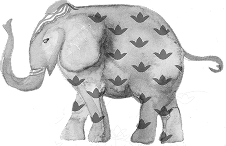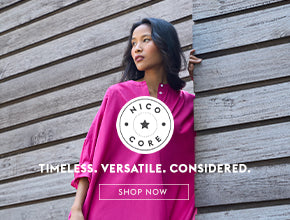Nicobar - Fashion’s Alternative & Sustainable Subculture
You know you've hit jackpot when you come across a design team going through an existential angst - to be or not to be-in a mall, that is! Yes, that's what Raul R. Rai and Nirmal Kaur (Co-Founder & CEO and Marketing Head respectively) of Nicobar are currently debating. Within the lush peaceful environs of their office (Tulsi farm in Sultanpur Delhi) – the pros and cons of how to have (if at all), a presence in a locale that represents everything the brand is not - mainstream, fast fashion and typical. To be in a mall without losing its identity, this represents the core of Nicobar's philosophy. With three stores between New Delhi, Mumbai and Bangalore, Nicobar has scaled up at twice the original projections with an expectation of braking even within the next 15 months. This makes it design house to study. The brands X-factor—its online portal and its pop up stores. The growth curve of this one-year-old label inspiring. Nirmal Kaur feels, "Our pop ups in Delhi, Jaipur, Ranthambore, Mumbai, Goa, Kochi, Dubai and Abu Dhabi along with a usually high conversion rate might be giving us that edge. It's not just the consumer segment in the metropolitan cites, the ones recognised as online shoppers that are our biggest clients. We get a lot of online traffic and sales from tier II and tier III cities like Surat. This is great because there is a market for our design ethos across the country. We also get a lot of orders from the South of India, which I feel has huge potential. "Nicobar's retail model is distinct from its contemporaries and others in its segment, as it focuses in a seamless omni-channel customer experience with user friendly elements- content led online experience, physical spaces and pop ups. Rai adds, "At Nicobar our team is a family. We have our own version of a 'democratic approach' to every step and process. Each person who is here has been chosen for a reason and we play to each others strength. Not only do we want to create a brand with a presence but we are aiming to create an entire culture, a movement which explores the many moods and facets of India. Our online journal, the Nico Journal, talks about modern Indian design and lifestyle change makers, which enables us to create an emotional connect with our customers. "The brand is expected to expand with 5 to 8 new stores in cities like Hyderabad, Chandigarh, and Chennai. Despite 15 to 20 per cent of their online revenue coming from International markets like the US, Middle East and Australia, they hope to capture more of this segment only once expansions in India are complete.But the struggle is real—a mall doesn't quite reflect the brands personality. Which is why the team at Nicobar is going beyond the conventional retail format with a cafe, experiential spaces like curate book corner, photo booth mini theatres and an entrepreneurs hub for its upcoming stores. In a nut shell its own little world in a mall. We live in a the day and age where the world is becoming exceedingly nationalist - take Brexit, 'Make America Great Again, the 'One China' policy, or not too far from home, the 'Make in India' program. It's becoming increasingly difficult to define individual identity or rather to avoid becoming part of the greater 'good' (as people would like you to believe). But design homes like Nicobar explore modern India by re-interpreting stereotypes, by going through the archives, finding lost patterns, re-styling textiles and fabrics for contemporary use. Most importantly through bustle subtext and minimal design it's creating an alternate Indian identity. Story as it appeared.


















 GET IN TOUCH
GET IN TOUCH